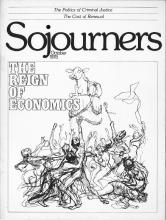There is a passage of scripture which helps us reflect on an important subject: economics. The passage, Acts 2, concerns the economy of Christian fellowship.
The passage begins by saying that the early Christians devoted themselves to teaching, to fellowship, to the breaking of bread, and to prayer. Many signs and wonders were done, it says, and all who believed were together and had all things in common. They were drawn together by the force of their fellowship.
I think the message of the passage, or at least the one that I want to emphasize, is that the coming of the Spirit had created among them a common life. The fruit of that common life was this: they sold their possessions and goods and distributed them to any and all as they had need.
Some day somebody should write a book about all the parts of scripture which we have spent so much energy in avoiding. This passage would be high on the list.
We've all heard the standard rebuttal to this scripture: that this was merely an early model for the church and that it failed. Being people who don't like failure, we can disregard it and thereby keep our economic lives private.
This common life didn't simply fail, however. There's much evidence that it found expression again and again in the life of the early church, and that it continues to find expression today.
Some others have sought a new rule for the church out of this passage, saying that a common purse is the road to church renewal.
The point is that this passage is neither a description of failure nor a new rule or model for the church. It is simply a description of what happened when the Holy Spirit invaded the life of the early Christians.
Read the Full Article

